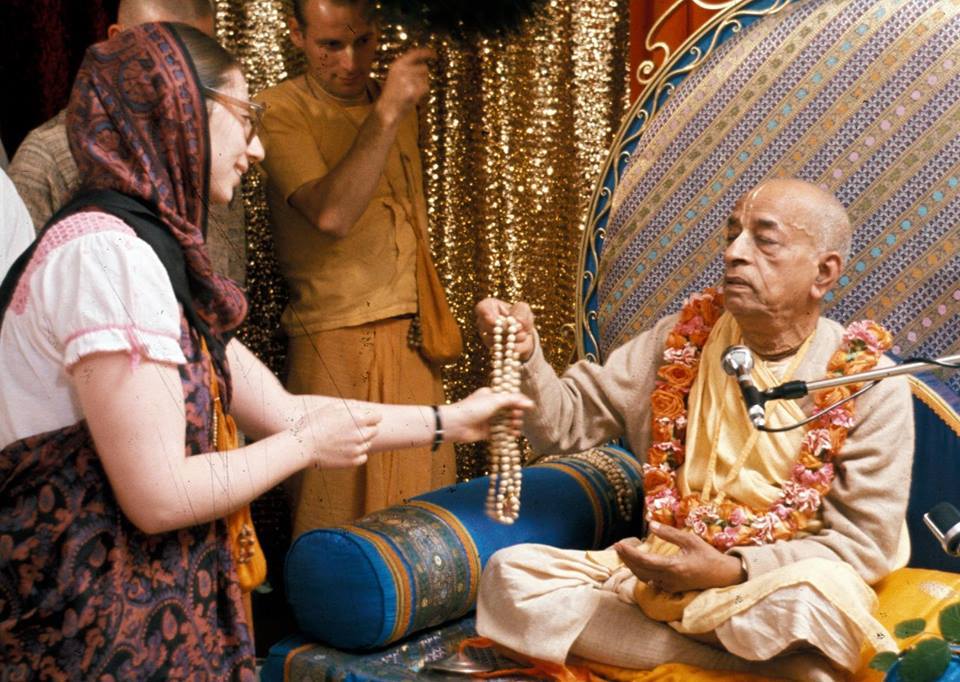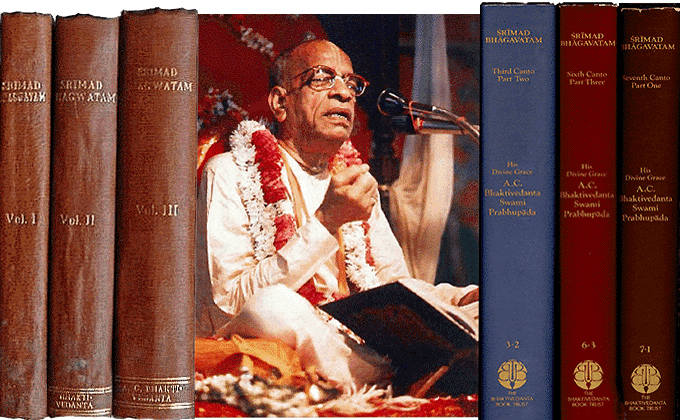Hare Krishna dear devotees,
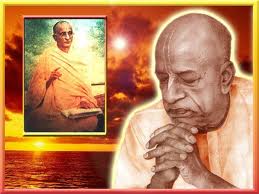
Few years back, I was preparing for a class by hearing a lecture given by HG Rukmini Krishna Prabhuji, from ISKCON Punjabi Bagh, repeatedly. Somehow, by Prabhuji’s mercy and potency, few lines from that lecture touched my heart and remain ingrained forever. Here are those lines-
‘Everyone in ISKCON should try to build a relationship with Srila Prabhupada. Prabhupada is preeminent shiksha guru of everyone in ISKCON and it will be very beneficial for our spiritual life if we build a personal relationship with Srila Prabhupada. And it is possible for everyone in ISKCON to build a personal relationship with him, not just his immediate disciples. We simply need to make efforts in that direction and we will definitely receive his reciprocation ”.
We are well aware that position of an acharya is very unique. An acharya not only teaches us but he also practices everything himself. Hence an acharya teaches us with his own practical example, which is a far easier and practical way to grasp for the conditioned souls.
Let us now see how Srila Prabhupada ‘practiced’ his own relationship with his spiritual master, Srila Bhaktisiddhanta Sarasvati Thakur, another exalted acharya in our line, and learn from him how we can we develop a permanent relationship with the lotus feet of our acharya- Srila Prabhupada.
An Acharya’s birth is not ordinary
So these äcäryas, they come and they go, that is not like ordinary birth and death. It is called prakaöa, aprakaöa; ävirbhäva, tirobhäva. So even ordinarily nobody takes birth and nobody dies, na jäyate na mréyate vä kadäcit [Bg. 2.20], so what to speak of the äcäryas or Bhagavän.
(Srila Prabhupada lecture — December 22, 1975, Bombay)
Who are these exalted Acharayas?
Bhakti-rasämåta-sindhu has given considerable discussion about nitya-siddha and sädhana-siddhadevotees. Nitya-siddha devotees come from Vaikuëöha to this material world to teach, by their personal example, how to become a devotee. The living entities in this material world can take lessons from such nitya-siddha devotees and thus become inclined to return home, back to Godhead. A nitya-siddha devotee comes from Vaikuëöha upon the order of the Supreme Personality of Godhead and shows by his example how to become a pure devotee (anyäbhiläñitä-çünyam [Bhakti-rasämåta-sindhu 1.1.11]). In spite of coming to this material world, the nitya-siddha devotee is never attracted by the allurements of material enjoyment.
….When the Lord Himself appears as an incarnation within this material world, He is not allured by the material atmosphere, and He has nothing to do with material activity, yet by His example He teaches the common man how to become a devotee. Similarly, a devotee who comes here in accordance with the order of the Supreme Lord shows by his personal behavior how to become a pure devotee. A pure devotee, therefore, is a practical example for all living entities, including Lord Brahmä.
(SB 7.10.3p)
Without their practical guidance..
The bona fide spiritual master, by his personal activities, teaches the disciple the principles of devotional service. Without personal service, one would go on speculating like the impersonalists and dry speculators life after life and would be unable to reach the final conclusion.
(SB 2.9.37p)
He is not dead and gone!
So now, by the grace of Krishna and Caitanya Mahaprabhu and in the presence of my Guru Maharaja, you are so nice boys and girls. So in front of Caitanya Mahaprabhu you are chanting Hare Krishna mantra, and you are taking part in it very seriously. So my Guru Maharaja will be very, very much pleased upon you and bless you with all benefits. [break]
So he wanted this, and he is not… It is not that he is dead and gone. That is not spiritual understanding. Even ordinary living being, he does not die. Na hanyate hanyamäne çarére [Bg. 2.20]. And what to speak of such exalted, authorized personality like Bhaktisiddhanta. He is seeing. I never feel that I am alone. Of course, when I came to your country without any friend, without any means… Practically, just like a vagabond I came. But I had full faith that “My Guru Mahäräja is with me.” I never lost this faith. And that is fact. There are two words, väëé and vapuù. Väné means words, and vapuù means this physical body. So väëé is more important than the vapuù. Vapuù will be finished. This is material body. It will be finished. That is the nature. But if we keep to the väëé, to the words of spiritual master, then we remain very fixed up. It doesn’t matter.
(Srila Prabhupada lecture – Atlanta, March 2, 1975)
I won’t die!
Kértanänanda: Why can’t you give us your old age?
Prabhupada: When I see that things are going on nicely, I am happy. What is this with this body? Body is body. We are not body.
Kértanänanda: Wasn’t it Purudäsa that gave his father his youth?
Prabhupada: Hmm?
Rämeçvara: Yayäti. King Yayäti traded his old age.
Kértanänanda: With his son. You can do that.
Prabhupada: [laughs] Who did?
Rämeçvara: King Yayäti.
Prabhupada: Ah. Yayäti. No, why? You are my body. So you live on. There is no difference. Just like I am working, so my Guru Mahäräja is there, Bhaktisiddhanta Goswami. Physically he may not be, but in every action he is there. I think actually I have written that.
Tamäla Kåñëa: Yeah, it’s in the Bhägavatam, that “He who lives with him, he lives eternally. He who remembers his words lives eternally.”
Prabhupada: So I am not going to die. Kértir yasya sa jévati: “One who has done something substantial, he lives forever.” He doesn’t die. Even in our practical life… Of course, this is material, karma-phala. One has to accept another body according to his karma. But for devotee there is no such thing. He always accepts a body for serving Krishna. So there is no karma-phala
(Conversation Pieces- May 27, 1977, Vrindavana)
Mercy is forever available to everyone, it is up to us to take advantage of it.
Prabhupada: You have to associate with both. Guru-kåñëa-kåpäya päya bhakti-latä-béja [Cc. Madhya 19.151]. Both guru’s kåpä and Kåñëa’s kåpä, they must be joined. Then you will get.
Jayädvaita: We’re very eager to get that guru-kåpä.
Prabhupada: Who?
Jayädvaita: We are. All of us.
Prabhupada: Yes. Yasya prasädäd bhagavat-prasädaù. If you get guru’s kåpä, then automatically you get Krishna.
Näräyaëa: Guru-kåpä only comes by pleasing the spiritual master, Srila Prabhupada?
Prabhupada: Otherwise how?
Näräyaëa: Excuse me?
Prabhupada: Otherwise how it can come?
Näräyaëa: So those disciples who don’t have opportunity to see you or speak with you…
Prabhupada: That he was speaking, väëé and vapuù. Even if you don’t see his body, you take his word, väëé.
Näräyaëa: But how do they know they’re pleasing you, Srila Prabhupada?
Prabhupada: If you actually follow the words of guru, that means he is pleased. And if you do not follow, how he can be pleased?
Sudämä: Not only that, but your mercy is spread everywhere, and if we take advantage, you told us once, then we will feel the result.
Prabhupada: Yes.
Jayädvaita: And if we have faith in what the guru says, then automatically we’ll do that.
Prabhupada: Yes. My Guru Maharaja passed in 1936, and I started this movement in 1965, thirty years after. Then? I am getting the mercy of guru. This is väëé. Even the guru is not physically present, if you follow the väëé, then you are getting help.
Sudämä: So there’s no question of ever separation as long as the disciple follows the instruction of guru.
Prabhupada: No. Cakhu-dän dilo jei... What is that, next one?
Sudämä: Cakhu-dän dilo jei, janme janme prabhu sei.
Prabhupada: Janme janme prabhu sei. So where there is separation? Who has opened your eyes, he is birth after birth your prabhu.
(Morning Walk—July 21, 1975, San Francisco)
A peek into the heart of Srila Prabhupada
Let us now read a pastime from the book ‘Miracle on Second Avenue’, an amazing account of the early days of ISKCON by of HH Mukunda Goswami. It was mercy of HH Gunagrahi Maharaj, who recommended this book to me and having read it, I would request everyone to read it, specially those who would like to build a stronger relationship with Srila Prabhupada by reading about him, his early days in west and how he preached to the westerners and started this movement.
This particular pastime gives us a peek into the very heart of Srila Prabhupada, his spiritual feelings and firm faith in his spiritual master. The background of the below pastime is that Srila Prabhupada has suffered a massive heart attack in New York. Doctors had told devotees that he may not survive this attack but by Krishna’s mercy, and devotees prayers, ‘he made it through’. Prabhupada was still recovering when he decided to visit San Francisco as local devotees there were preparing for the first ever Rathayatra. Devotees had taken a beach front house on rent for Srila Prabhupada, where it was peaceful and quite for him to to rest and recover.
While reading the below pastime please do keep in my mind that these are very early days of ISKCON, its June 1967, devotees are new to Krishna consciousness, they are young and innocent, but their hearts are sold out to Srila Prabhupada. Here we go, as HH Mukunda maharaja recalls this particular pastime with his spiritual master –
On his second day there, I knocked on his door and sat down on the floor in front of the bed he was sitting on.
“How are you feeling, Swami?” I asked.
He continued to chant softly, gazing at the somewhat primitive painting of Radha and Krishna on the wall to his right painted by a devotee artist. I thought maybe he hadn’t heard me, but after a few minutes he put down his beads and stood up.
“What is this body?” he said, making a gesture with his palms open and his arms outstretched. He looked almost disgusted to inhabit an ephemeral body and incredulous that I would be concerned to inquire about the state of something so fleeting. I realized that although I had read about the temporary nature of the body and the eternality of the spirit soul, he was actually living that philosophy.
For him the material world was not as important as the spiritual world, and he didn’t really care about his body coming to an end.
I went back into the kitchen and told Hayagriva and Kirtanananda about what the swami had said and my impression of what he meant.
“He’s not concerned about leaving his body for himself, because he’ll go back to be with Krishna,” Hayagriva said. “But what would happen to the movement if he was to die?”
“What?” My mouth hung open.
“All I’m saying is that he’s going to leave his body some time,” Hayagriva said. “Maybe you should ask him if someone should take over when he dies.”
“Maybe you should ask him,” I said. I thought he was being a bit too pragmatic about such a sensitive issue.
“No, it should be you,” Hayagriva insisted. “You’re the one he talked to about it.”
“Well, actually, no, he didn’t,” I clarified. “I was the one who started thinking about this stuff because of his comment about his body.”
“Whatever the case, we need to know how we should continue our Krishna consciousness education if he’s not here, shouldn’t we? And how we’d keep his movement alive, right?”
I thought for a few seconds. As blunt as Hayagriva was being about the issue, I had to admit that deep down I wanted to know the answers to these questions for myself too.
“OK, I’ll ask him,” I said. “I guess somebody has to ask about it eventually, and I guess it may as well be me.”
I knocked on his door again.
“Yes?” the swami said from within.
“Swami, can I ask you a question?” I asked. “Yes.” He sat down on his bed again.
I took a deep breath.
“When you die, what will happen to the movement?” I asked. “Will you have a successor who will continue your work and look after our spiritual education?”
As I heard myself say the words, I realized it had been a mistake to ask this. I saw suddenly that I had been put forward to ask this delicate question on someone else’s behalf. The swami sat silently, looking out the window at the sand dunes and the mountains. It was high tide and I could hear the waves pounding the beach. Gulls shrieked. I could feel two sets of ears straining from the kitchen to hear his answer.
The swami muttered something quietly.
“I couldn’t hear what you said, Swami,” I said carefully. “Can you repeat it?”
“Actually, it is an insult to the spiritual master,” he said a little louder.
He turned away from the window and looked at me pensively, as if he was hurt by my question.
“I’m sorry, Swami,” I said. I felt like shrinking into the carpet. He closed his eyes. Outside a dog barked. A shallow stream of tears appeared below each of his eyes and flowed over his cheeks.
He slowly wiped them away. “My spiritual master …” he said, and his voice choked to gravel. I was stunned. What had I done?
“My spiritual master,” he said, “he was no ordinary spiritual master.” He paused again, and then whispered falteringly, “He saved me.”
“I’m sorry,” I said. “I’ll go now.” I was too overcome myself to say more.
Hayagriva and Kirtanananda looked furtive when I came back into the kitchen. I pushed past them and went and sat out on the porch by myself. The swami’s answer was crystal clear to me. There was no question of replacing the spiritual master. His potency to teach would not end with his death but would continue even in his physical absence. What struck me the most was the way the swami taught me this. He didn’t just tell me with words; he showed me through his spiritual emotion toward his own spiritual master.
“The swami is no ordinary spiritual master,” I thought to myself. “I must learn to love and serve my spiritual master unconditionally with the fidelity and loyalty with which he serves his.”
I brushed a few grains of imaginary sand from my hands and went back into the house to talk to Kirtanananda and Hayagriva about the swami’s instruction to us all.
( Miracle on Second Avenue, by HH Mukunda Goswami, chapter 21)
Conclusion
Thank you very much for your sincere endeavor and faith in your Spiritual Master. The key to success in spiritual life is to always endeavor to please the Spiritual Master, and follow his instructions. One who is determined in this effort will advance very quickly in Krishna consciousness.
So far personal association with the Guru is concerned, I was only with my Guru Maharaja four or five times, but I have never left his association, not even for a moment. Because I am following his instructions, I have never felt any separation. There are some of my Godbrothers here in India who had constant personal association with Guru Maharaja, but who are neglecting his orders. This is just like the bug who is sitting on the lap of the king. He may be very puffed-up by his position, but all he can succeed in doing is biting the king. Personal association is not so important as association through service.
(Letter to Satadhanya—Calcutta, 20 February, 1972)
I hope and humbly pray that it touches your heart as it touched mine, that we all feel inspired to daily, and carefully, read Srila Prabhupada books and start following his instructions.
All glories to Sri Guru and Gauranga.
All glories to Srila Prabhupada.
your servant.
Giriraj dasa
Kindly visit the the blog site to read more blogs - https://www.forthepleasureoflordkrishna.com
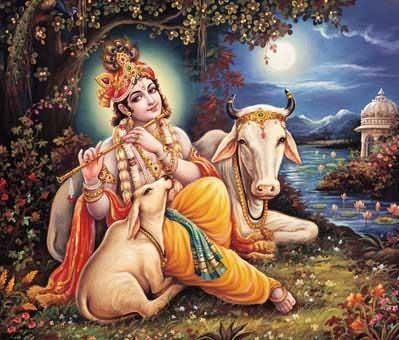

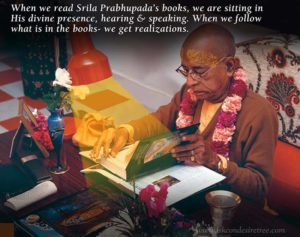
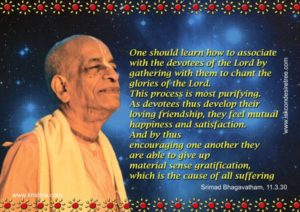
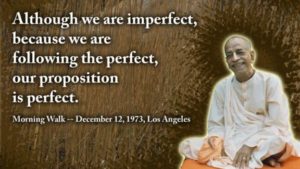
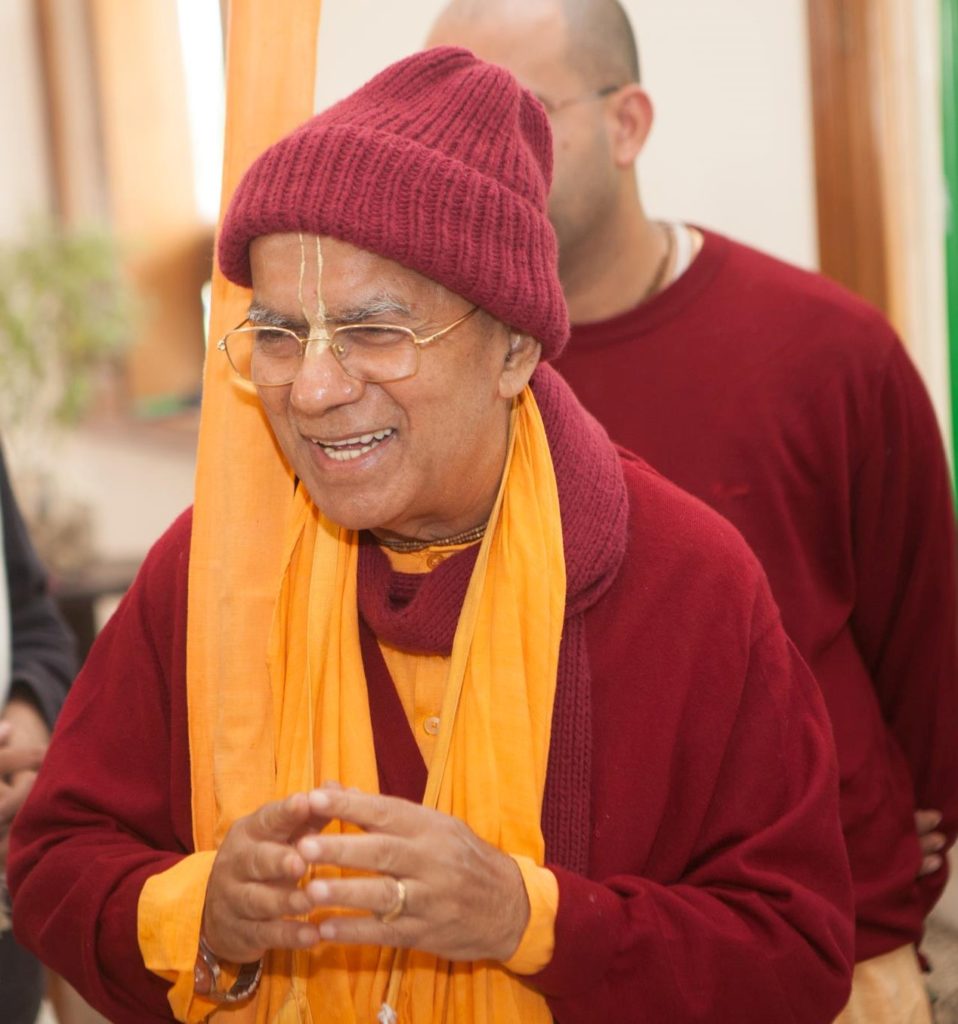
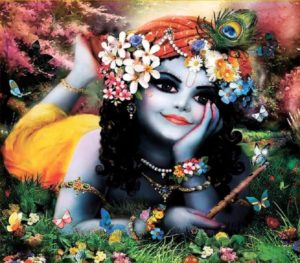
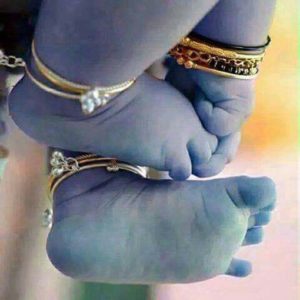



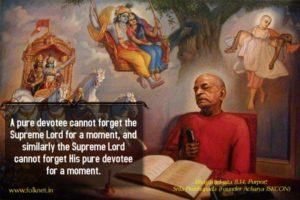
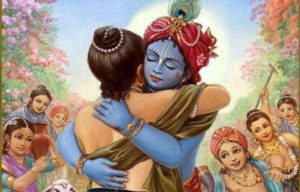
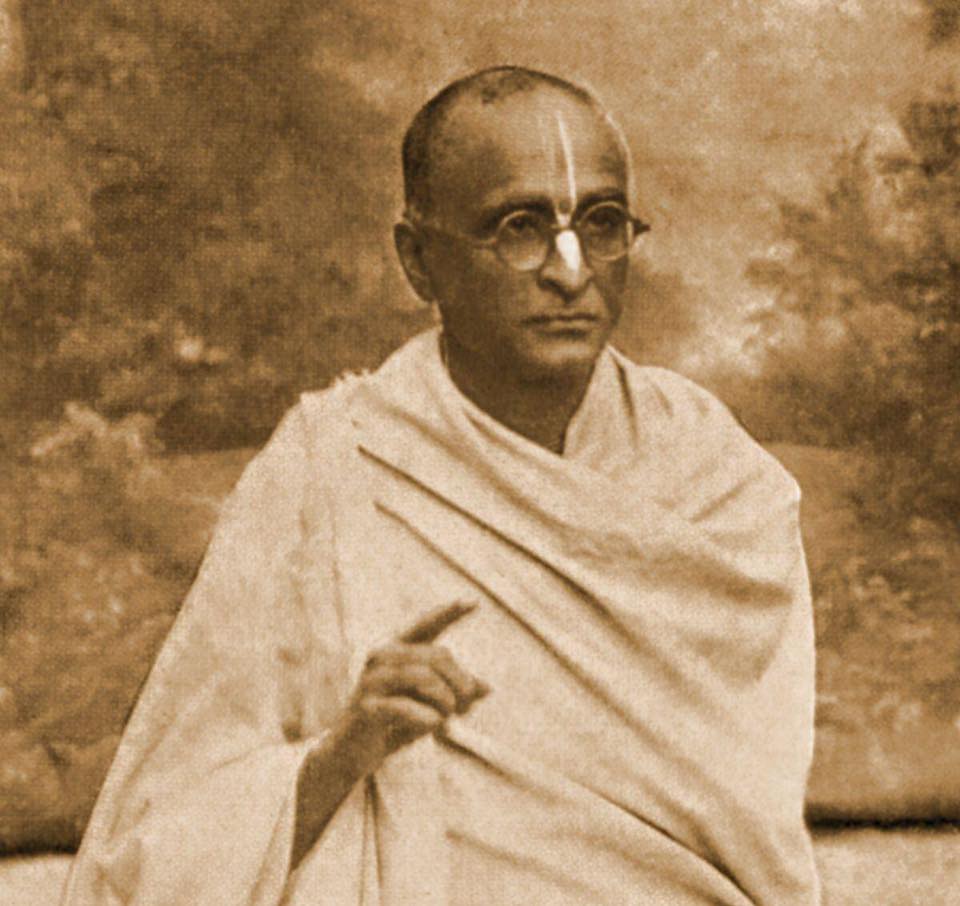
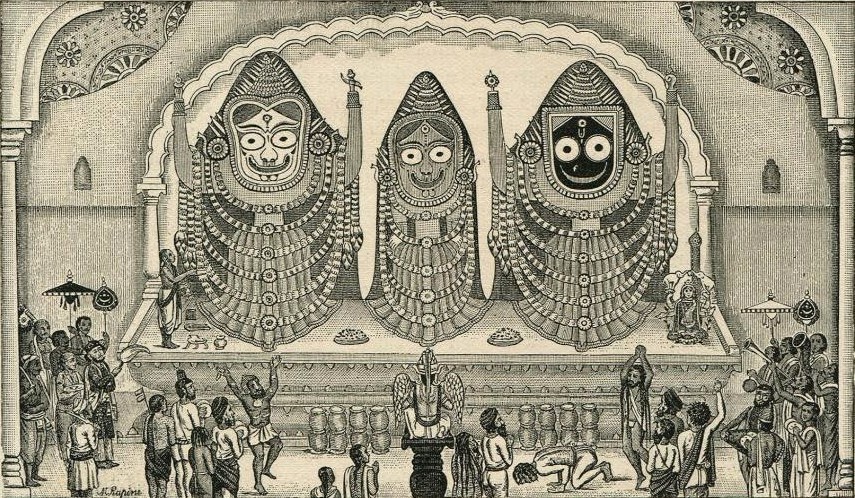 Hare Krishna and pranams dear devotees,
Hare Krishna and pranams dear devotees,